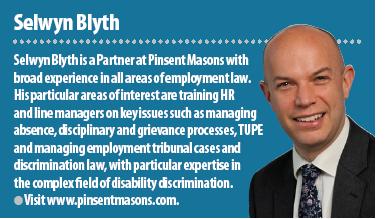Selwyn Blyth, employment law specialist at Pinsent Masons, comments on the latest trolling backlash and the growing importance of social media policies in the workplace
‘Trolling’, a phrase once reserved for those with a digital know-how, has made its way into mainstream media with the recent plight of Caroline Criado-Perez.
 As the country shares in a mutual distaste for those who hide behind their computer screens to abuse and intimidate, calls for the naming and shaming of offending individuals have never been stronger.
As the country shares in a mutual distaste for those who hide behind their computer screens to abuse and intimidate, calls for the naming and shaming of offending individuals have never been stronger.
And just as the criminal is some mother’s son; the troll is very likely someone’s employee. So what are the repercussions for a company whose employee is uncovered as an Internet troll?
If the attack is toward a fellow colleague, then the lines in the sand are pretty clear. In this instance, the employer would have fair cause to discipline or sometimes dismiss the employee for bullying or harassment. Even if the employee was to argue they were doing it in their own time, on their own device. The fact a very clear link between their actions and the impact on their relationships at work can be demonstrated should rule in favour of disciplinary action on the part of the employer.
If an employee was found to be abusing anybody else – whether in the public eye or not - under the same circumstances (in their own time, on their own device) it can become more difficult to show a link to the workplace such as damage to a company’s reputation.
Trolls may regard their right to abuse as a human right. But what they should remember is freedom of expression is only a qualified concept. With regards to employment, the threat to a brand or company’s reputation is enough to quash, or at least challenge, such a right.
Employers need to consider measures that protect them should such an incident arise.
When e-mails replaced the office fax machine, employers made concerted efforts to develop company policies that governed how employees were to use company e-mails and Internet, covering the bases of inappropriate behaviour.
With the rise in social media channels, and the fast-paced nature of the digital world, employers risk having inadequate provisions for dealing with those employees whose behaviour on social media threatens the company’s reputation or their relationships with colleagues, customers or clients.
What is equally important is having training in place to educate managers on how to communicate these policies to all employees, perhaps as part of an induction programme. This training ensures all employees are aware of the ramifications should they be linked to any activity, which threatens to bring the company into disrepute, irrespective of whether they do it in their own time, on their own device.
Once resigned to living under bridges, ‘trolls’ now walk amongst us, hidden behind the perceived protection of a tablet or computer screen.
It’s only a matter of time before the worst offenders are smoked out, similar to the naming and shaming of football hooligans in 1998, when employers sometimes dismissed employees for damaging their reputation when ‘outed’ in the press.
In the meantime, companies across the country will wait with bated breath. The smart ones will also be setting clear social media policies and putting training procedures in place in preparation.

Photos: Top - Trolling, Bottom - Selwyn Blyth, Pinsent Masons